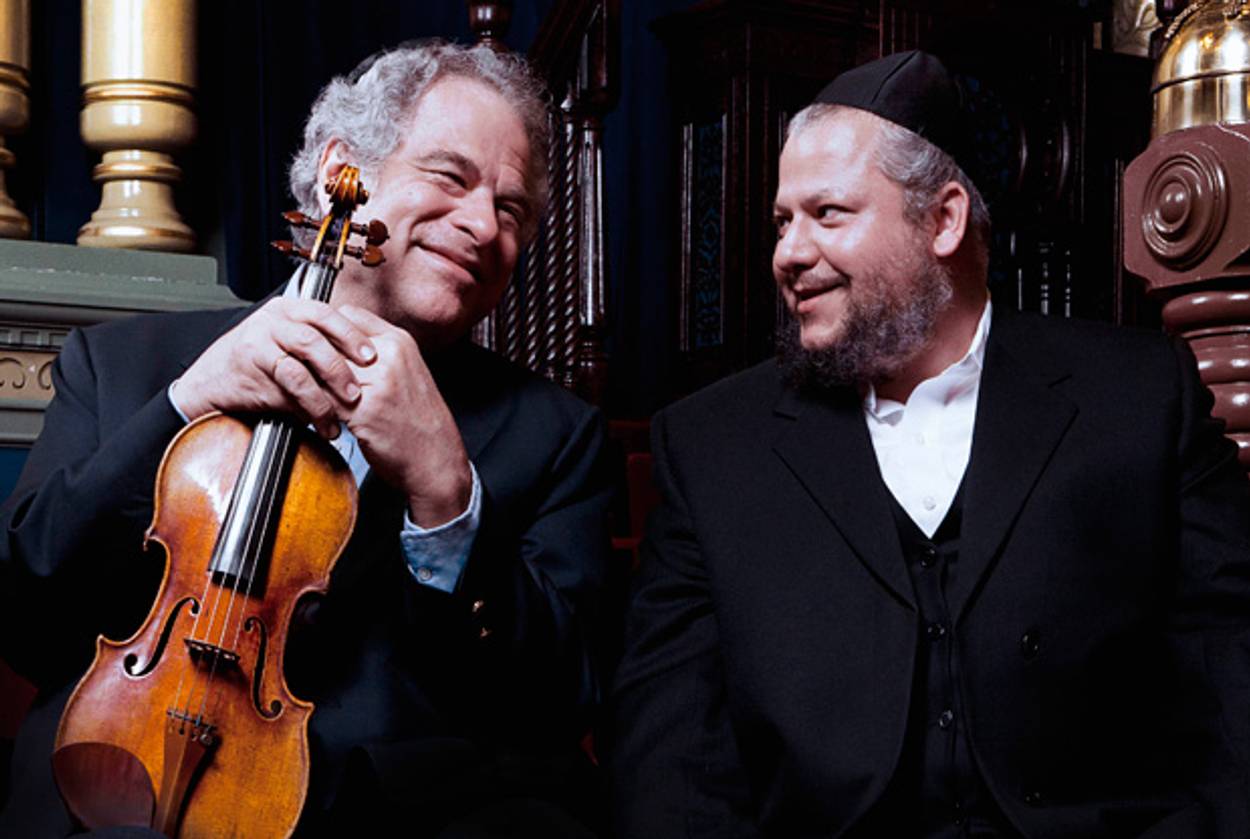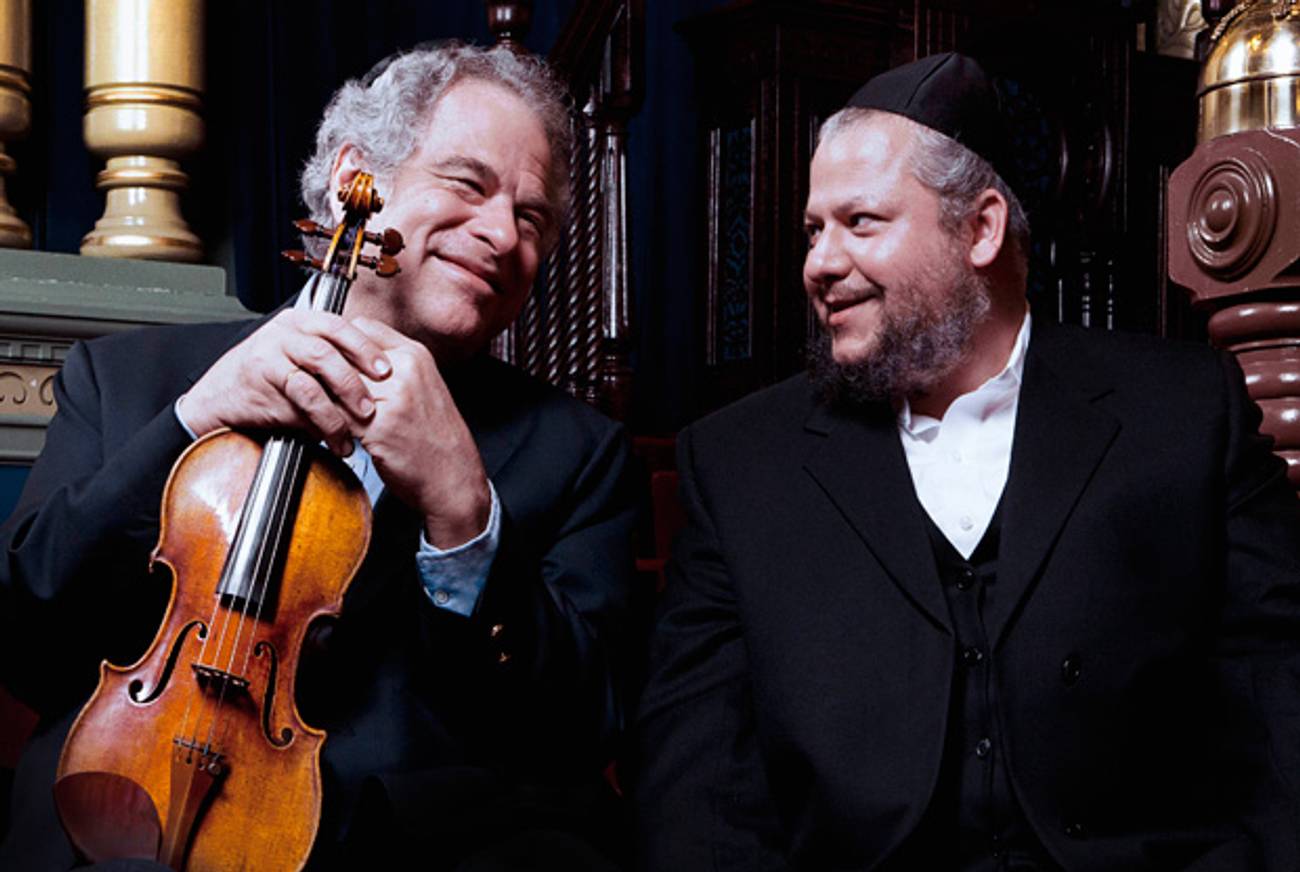Bruce Ratner’s Home Courtship
In a bid to attract Brooklyn’s Jews, the Barclays Center hosts Itzhak Perlman and a legendary cantor




One good turn, they say, deserves another: Last year, Jay-Z, the king of rap, put on a blinding white dinner jacket and made his debut at Carnegie Hall, the high cathedral of American classical music. So it’s only right that Itzhak Perlman, the patron saint of concert violinists, should reply by playing the house that Jay built: Brooklyn’s Barclays Center.
Tonight, Perlman will join the superstar Park East Synagogue cantor Yitzchak Meir Helfgot onstage at the intersection of Atlantic and Flatbush Avenues—Perlman’s first arena show, he says, since an appearance he made at Madison Square Garden as a teenager in a Hanukkah concert. The duo will play a selection from Eternal Echoes, the album of liturgical music they released last year. “We were looking for a venue in New York, so why not do it right there, where you have a lot of the Jewish community?” Perlman said last week. “To do it in Brooklyn was something that just seemed right.”
As it happened, Perlman’s old friend Bruce Ratner—the developer behind Barclays Center and its companion housing development, Atlantic Yards—had been thinking about bringing a Jewish act to his new arena, which Jay-Z opened with a weeklong run in September. “I want to do special programs, and an idea I had was to do the ‘Three Tenor’ cantors, to have three great cantors sing,” said Ratner, an enthusiastic fan of classical cantorial music. “And then Itzhak Perlman calls me and says, ‘How about doing Cantor Helfgot and me in concert together?’ ” Ratner’s reply was immediate. “He said three times ‘I love it,’ and he repeated it several times,” Perlman told me.
Today, klezmer has recovered a certain degree of hipster credibility, but not even Ratner expects twentysomethings in Bushwick to listen to renditions of Yism’chu or Kol Nidrei on their iPods, as he does. “Marketing cantorial music is different from marketing Jay-Z, and marketing Jay-Z is different from marketing Coldplay,” Ratner said. But he described Helfgot as both the Beyoncé and the Lebron James of cantorial music—a superstar within a much smaller galaxy than pop music or NBA basketball. Barclays has made sure to set aside three sections for separate-sex seating to accommodate religiously observant concertgoers. The arena’s regular kosher concessions, including food catered from the Midtown Manhattan restaurant Abigael’s, will be open—and the show itself was scheduled on a Thursday to avoid Shabbat and its demands on weekend leisure time.
But the show will be a test—not just of whether there’s an arena-scale audience in New York for Jewish liturgical music, but of whether Barclays Center, best known as the home of the Brooklyn Nets basketball team, can be all things to all the diverse communities its backers want to serve. In its short life, it has been a sports arena, a music stage for Barbra Streisand, and a home to holiday spectaculars on ice. But Ratner, who began his professional life as New York’s city-appointed consumer advocate, has ambitions to make Barclays into a public space that, like the windows on the building’s exterior, reflects the diversity of its neighborhood: a place where liturgical music concerts co-exist with gospel, reggae, and rap.
“Everyone talks about, ‘Should we have an arena, should we have stadiums,’ and costs and subsidies and all that stuff,” Ratner said. “But the piece that’s not factored in is what it’s worth to somebody to have what I call the whoosh moment.” What’s the whoosh? “It makes you happy for two hours in this somewhat miserable world,” Ratner explained. “If we can bring that to people, that’s great, and part of that is trying to bring as much to the arena as possible that caters to as many tastes, viewpoints, religions as possible, including the Hasidic community.”
A century ago, Brooklyn was one of the capitals of Jewish music. Yossele Rosenblatt, the biggest cantorial star of the era, was engaged by a congregation in Borough Park, which he used as a base for touring the United States and Europe, and after World War II, the renowned Polish singer Moshe Koussivitzky—a veteran of Carnegie Hall—installed himself at Brooklyn’s Temple Beth El, then one of New York’s most prestigious Orthodox pulpits.
Part of Ratner’s goal with this new concert, he said, is to introduce Barclays to its Jewish neighbors in Borough Park and south Williamsburg. Because of the physical requirements of strict Jewish observance—synagogues in walking distance from housing, apartments with three and four bedrooms, Shabbat elevators and eruvim—Ratner said he expects few, if any, ultra-Orthodox Jews to move into the heavily subsidized affordable housing units being constructed as part of the Atlantic Yards project, right next to Barclays. “It would be hard to transplant an offshoot community to downtown Brooklyn,” he said. But he wants observant Jews to think of Barclays as a place for whoosh, too. “My guess is that the Hasidic community and Jewish community will be using it, whether for weddings or other events,” Ratner said. “It helps, probably, that we’re doing this because they realize that the managing principal is very open to anybody, and to Jewish events.”
And even if it doesn’t, Ratner will have the satisfaction of putting on a show he really wants to see—one of the perks of stadium ownership. “I joined Park East so I could listen to Helfgot but I never got around to it, and I don’t get to hear Itzhak,” Ratner told me. “So see the show, is what I want to do. It’s not so much a feeling of, ‘My God, I did it.’ I just really want to see the show.”
***
Like this article? Sign up for our Daily Digest to get Tablet Magazine’s new content in your inbox each morning.
Allison Hoffman is a senior editor at Tablet Magazine. Her Twitter feed is @allisont_dc.
Allison Hoffman is a senior editor at Tablet Magazine. Her Twitter feed is @allisont_dc.